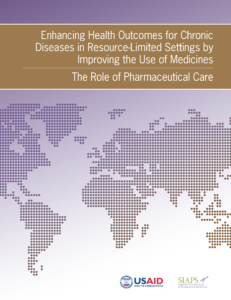Historically, the primary focus for health systems in low- and middle-income countries has been on preventing and treating highly prevalent, acute infectious diseases such as malaria and  tuberculosis. However, as medicines and health care have improved, these countries are now experiencing an increasing burden of chronic noncommunicable conditions, such as diabetes, cardiovascular diseases, and HIV and AIDS. To treat and control these diseases, affordable, safe, effective medicines must be continually available along with quality care, patient education, and supportive services.
tuberculosis. However, as medicines and health care have improved, these countries are now experiencing an increasing burden of chronic noncommunicable conditions, such as diabetes, cardiovascular diseases, and HIV and AIDS. To treat and control these diseases, affordable, safe, effective medicines must be continually available along with quality care, patient education, and supportive services.
In many countries, pharmacy practice is evolving from just selling or dispensing medicines to providing patient-centered services, including pharmaceutical care, that support better health care and outcomes. Pharmaceutical care encompasses the responsible provision of medications to health facilities and providers and ultimately to patients. It calls for all members of the care team (physicians, nurses, pharmacists, pharmacy assistants, community health workers, and the patient) to actively collaborate to prevent or solve medicine use problems for optimal health care for the patient.
SIAPS’ operational approach to strengthening pharmaceutical care practice in resource-constrained settings focused on several areas:
- Building the capacity of institutions and individuals in pharmaceutical systems through efforts such as training, better information systems, and improved infrastructure
- Identifying appropriate roles for staff members who provide medicines or medication-related services at each care level
- Building and expanding partnerships among various stakeholders so that all involved groups can approve of and support interventions and activities and effectively coordinate their work to achieve the best outcome without duplicating efforts.
SIAPS helped countries to enable all health workers to incorporate pharmaceutical care components into their traditional activities, such as medicine information and counseling and treatment adherence support.
To learn more about how SIAPS helped establish systems to improve pharmaceutical care, check out our implementing tools, such as the Electronic Dispensing Tool, that help pharmacy staff monitor treatment adherence and provide better patient follow-up or read Enhancing Health Outcomes for Chronic Diseases in Resource-Limited Settings by Improving the Use of Medicines- The Role of Pharmaceutical Care.
Featured Publications
- National Assessment on the Status of Implementation of Clinical Pharmacy Services at Public Hospitals in Ethiopia
- Improving Health Outcomes through Delivery of Patient-Centered Pharmaceutical Care by Pharmacists in Low- and Middle-Income Countries

